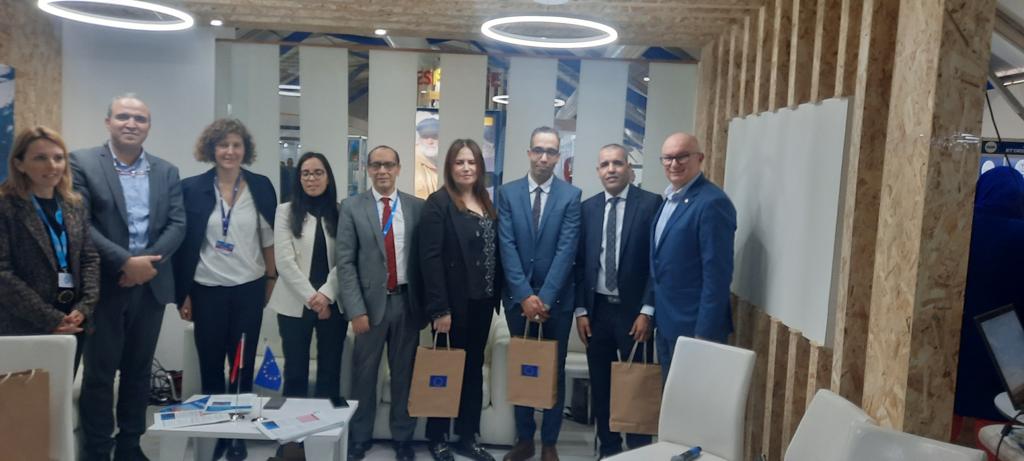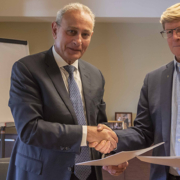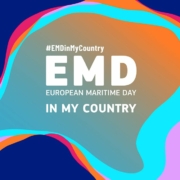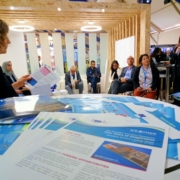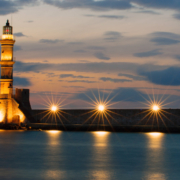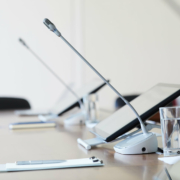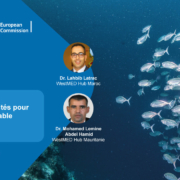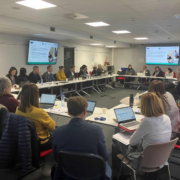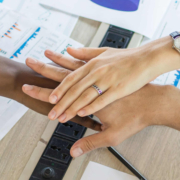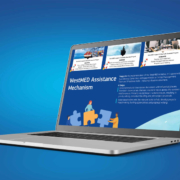La 6ème édition du Salon Halieutis a eu lieu à Agadir du 1er au 5 février. Il s’agit du plus grand événement international pour la pêche, l’aquaculture et la transformation des produits de la mer au Maroc.
Le mécanisme d’assistance WestMED, et en particulier les représentants du Hub WestMED du Maroc et de la Mauritanie, ont participé au Salon. Ils ont rencontré des visiteurs au stand européen et ont organisé un atelier sur les « opportunités de l’économie bleue au Maroc ».
M. Mohamed Yassine El Aroussi, coordinateur national marocain du WestMED au ministère de l’Agriculture, de la Pêche, des Affaires maritimes et du Développement rural, a souhaité la bienvenue aux participants de la session et a salué l’opportunité d’organiser l’événement WestMED en marge du Salon Halieutis, qui offre une plateforme précieuse aux experts pour se réunir et partager leurs connaissances et expériences.
Il a également souhaité la bienvenue au nouvel expert marocain, M. Lahbib Latrach, qui sera le centre d’expertise WestMED pour le Maroc. M. El Aroussi a assuré que le point focal marocain est prêt et engagé à travailler en étroite collaboration. Cette coopération devrait apporter de nouvelles et passionnantes opportunités pour le succès de l’initiative WestMED.
M. El Aroussi a également exprimé son grand plaisir d’accueillir l’équipe mauritanienne de WestMED et la valeur de cette participation, démontrant ainsi le fort engagement de la Mauritanie envers le développement et la croissance de l’économie bleue en Méditerranée occidentale.
M. Lahbib Latrach, a présenté le contexte de l’initiative WestMED, sa structure, sa mission, sa vision et le programme technique correspondant. Il a souligné l’importance d’impliquer toutes les parties prenantes, y compris les gouvernements, les institutions de recherche et d’enseignement, les organisations non gouvernementales ainsi que le secteur privé pour améliorer l’innovation, le renforcement des capacités, l’échange de connaissances afin de créer une alliance nationale qui renforce les secteurs de l’économie bleue. Son intervention s’est terminée par le partage des résultats de certains projets assistés, et des appels à financement disponibles pour les projets d’économie bleue.
Du centre national WestMED de Mauritanie, M. Mohamed Lemine Abdel Hamid a présenté une vue d’ensemble de l’initiative WestMED, les principaux projets, les opportunités de financement et les principales réalisations au cours des quatre dernières années. Il a également fait remarquer au cours de la session les priorités de la nouvelle coprésidence WestMED de la Mauritanie et de Malte pour 2023. Au niveau national, la Mauritanie a fixé des objectifs ambitieux en matière d’économie bleue, notamment la promotion de la pêche et de l’aquaculture durables, le développement d’un cluster maritime réunissant tous les acteurs de la mer, le développement du transport maritime et le développement de la planification de l’espace maritime (PEM).
Dans le cadre de l’initiative WestMED et avec le soutien de CINEA et de la DG MARE, la Communauté de pratique sur la planification de l’espace maritime (PEM) pour la Méditerranée a été lancée le 26 janvier lors de la réunion de lancement à Bruxelles. Mme Laila BENSMAIL, membre du comité directeur de WestMED et experte nationale en PEM, a présenté la Communauté de pratique au Salon Halieutis. L’objectif principal de la Communauté de Pratique MED-MSP est d’établir une communication permanente et un dialogue transfrontalier entre les experts de la PSM (c’est-à-dire les planificateurs, les experts techniques, les chercheurs), et d’échanger des connaissances et des expériences pertinentes dans la région, afin de parvenir à une perspective partagée sur des sujets d’intérêt commun sur la PSM et de renforcer la coopération entre le nord et le sud de la Méditerranée. Le développement de la PSM dans des pays comme le Maroc et la Mauritanie est l’une des principales priorités des gouvernements nationaux.
Ensuite, la Commission européenne (DG MARE) a présenté les appels à propositions en 2021 et 2022 relatifs aux projets phares sur l’économie bleue en Méditerranée occidentale. Le premier appel à propositions en 2021 visait à renforcer la compétitivité et la durabilité des secteurs du tourisme côtier et maritime en Méditerranée occidentale. Tandis que l’appel de 2022 s’est concentré sur deux nouveaux sujets : le transport maritime vert et les ports et clusters maritimes. Plus d’informations sur : https://cinea.ec.europa.eu/news-events/news/emfaf-blue-careers-and-regional-flagships-calls-proposals-are-now-open-2022-10-13_en
A titre d’exemples de bonnes pratiques de projets financés par les appels de la FEMF, trois projets d’économie bleue ont été présentés au Salon : REBOOT MED – Recovering, Experiencing and Boosting eco-tourism in the WestMed, AFRIMED : Algal Forest Restoration In the MEDiterranean Sea et E-FishMed project : virtual academy on fisheries inspection and control.
Dans l’ensemble, l’atelier s’est avéré être une source d’inspiration pour les visiteurs et un bon endroit pour que le WestMED rencontre et interagisse avec ce secteur important et en pleine croissance.
